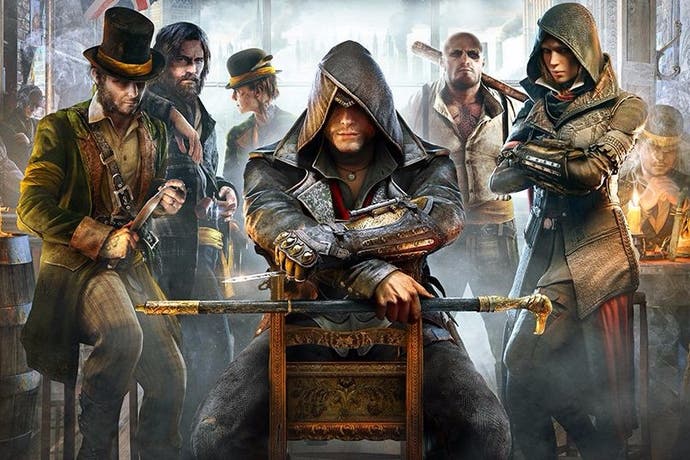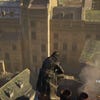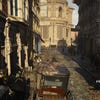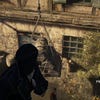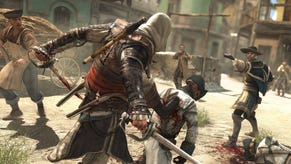Digital Foundry on the Assassin's Creed Syndicate reveal
Has the Unity disaster forced Ubisoft into a more conservative technological approach?
Was Assassin's Creed Unity simply too ambitious for its own good? Revolutionary Paris - densely populated, rich in detail - looked beautiful on a high-end PC, but the experience didn't translate well to less capable hardware, including PS4 and Xbox One. Riddled with bugs at launch and suffering from severe frame-rate problems, our sense is that Unity's heart was in the right place, but its execution was brand-damaging stuff. From what we've seen of its successor, Assassin's Creed Syndicate, perhaps Ubisoft is executing a course correction that could see tangible improvements in stability, but the question is whether it comes at the expense of the raw ambition behind the core technology.
Of course, what we've seen so far is indeed 'pre-alpha' - and it shows, mostly via some occasionally jarring geometry pop-in - and while we can debate just how much more can be achieved in the few months of development remaining until Syndicate is released, what's clear is that Ubisoft's reveal is at least authentic. In the current marketing climate, that is refreshing - we're pretty convinced that what we're seeing in the two launch videos is indeed actual gameplay, and while there may be some use of debug cameras in the shorter trailer, we're fairly sure that this is the actual game as it currently looks in Ubisoft's studios. There's no CG trailer fakery in effect here: Syndicate may well have unpolished elements in its current form, but crucially, real code is used to market the game - and that's important. There's the sense that Ubisoft is giving it to us straight, and that kind of honesty should be recognised and applauded.
That's not to say that Ubisoft isn't afraid to use PC technology to aid the presentation though. We're fairly sure that it's the PC version taking centre-stage in these initial materials, and there's a likelihood that the game is running at 2560x1440 resolution downscaled to 1080p, perhaps via Nvidia's DSR super-sampling technology. Despite this, noticeable shimmer and pixel-popping artefacts are still evident, when Ubisoft could have SLIed a couple of Titan Xs and scaled down from 4K to tidy up the imperfections. In terms of anti-aliasing, there does seem to be an upgrade over the FXAA offered by AC Unity - it still looks like a post-process solution, but the presence of some ghosting suggests an additional layer offered by a temporal component, where information from previous frames is retained and integrated into the new image for better coverage. Again, Ubisoft could have used the AnvilNext engine's MSAA support to make these initial materials look smoother and cleaner, but it elected not to.
On a broader level, based on the limited materials we have to look at, it seems that the core elements of the renderer are mostly unchanged from AC Unity. The big upgrades from Black Flag remain in place - Ubisoft retains the physically-based rendering system, allowing materials to more accurately interact with the surrounding light sources. Global illumination is similarly impressive, while the enhanced physics engine also remains in place. The 'next-gen' iteration of the AnvilNext engine that debuted in Unity took advantage of the much higher memory allocation available on the new wave of consoles in order to handle bigger maps, more objects, larger buildings and more detail.
However, based on the assets Ubisoft has released thus far, there's a good argument that certain advances made in Unity have also been dialled down. Revolutionary Paris saw a generational leap in terms of the amount of NPCs, their behaviours and their overall variety, compared to any of the last-gen Assassin's Creed outings. This clearly resulted in a considerable stress on the CPU, contributing at least in part to sub-20fps performance in places on both PS4 and Xbox One.
Certain shots in the Syndicate trailer hint at some challenging scenes for the engine, but the extended gameplay video appears to limit NPCs, with the numbers only pushed in the punch-up sequence between the two gangs towards the end of the sequence. Syndicate is set in 1868, by which time the population of London stood at around 3m people. Assassin's Creed Unity hinted at a game engine capable of capturing a semblance of that scale and scope, but based on the existing Syndicate material at least, there is the sense that Ubisoft's ambitions here aren't quite as grand - so we can't help but wonder whether features are being traded for overall game stability, or whether the inclusion of new additions (such as the traffic) requires compromises elsewhere.
With that said, there is the sense that in many respects Ubisoft is keeping its powder dry, almost certainly in order to show more at this year's E3. This may explain the somewhat puzzling choice of location seen in the gameplay demo. By 1868, pretty much all of the capital's iconic landmarks - bar Tower Bridge - had been completed, yet aside from a curiously angular St Paul's, most of the action we see in this all-important initial reveal is set in nondescript streets, with a somewhat uniform look in the buildings and structures in terms of geometry and artwork. We need to look towards the shorter trailer in order to get a real sense of what the city has to offer, but there are still some concerns here. Nineteenth century London was dirty, polluted, perilously smoggy and densely overcrowded in its poorer wards - and that isn't quite the impression offered by the Syndicate materials seen thus far.
Some of the core Unity engine enhancements still shine through though: there's still a convincing sense of depth and texture in the materials used, and once again the Unity engine's PBR works beautifully in ensuring that lighting is consistent, even if the overall aesthetic perhaps mirrors the last game a little too closely. The effectiveness of the PBR solution extends beyond the environments and towards the characters too, where the extreme detailing on clothing that we saw in AC Unity remains in place, backed by excellent, detailed skin shaders and accomplished animation.
However, we do note that rendering strands of hair still causes sub-pixel break-up - this compromised the appearance of characters in Unity, and could be an issue in Syndicate, especially on console should AC Unity's 900p resolution remain in place. In the reveal materials, the issue is mitigated to a degree by the downsampling from a higher resolution though it is still noticeable in places. To be honest though, our biggest concern in this area isn't so much about the technology. The bizarre dialogue, mannerisms and names of the characters (Bloody Nora and the Blighters... really? Really?) suggests that Ubisoft doesn't really get London or the British, relying on tired clichés and stereotypes to bring some 'colour' to the world.
So if innovation in terms of technology is limited, has Ubisoft pushed boundaries elsewhere? We understand that Syndicate's London is approximately 30 per cent larger than last year's Paris, and to facilitate easier traversal across the map, horse-drawn carriages and other vehicles are available. Trains are also glimpsed in the press materials, but we don't get to see them in use during gameplay. The nineteenth century time period is a fascinating choice for Ubisoft - it's the most modern Assassin's Creed to date, necessitating new gameplay functions in order to accommodate the relentless progress of technology - and hopefully we'll get to see more of that soon.
Stealth also sees a different approach too, the old mechanics of blending into the throng of NPCs are exchanged for a more traditional gaming approach of taking cover behind elements of the environment. Enemies can also be dispatched at range, shown in the demo with NPCs standing almost comically below suspended barrels that came crashing down on their heads once the rope supporting them is cut. Post-assassination, debris just seems to vanish into thin air - the whole system seems a bit implausible and rather cartoon-like, and we can't help but hope that Ubisoft has better ideas for some smarter, more believable uses of the environment.
Elsewhere, the parkour element of the game is bolstered with the inclusion of a grappling hook, making it easier to reach the rooftops, while also providing zipline opportunities - a useful addition bearing in mind how wide many of the streets are. Smoother navigation is also promised - a much-needed revision after AC Unity's frustrating habit of auto-clambering over incidental environment detail. Combat also sees a new approach, with what we're told are more responsive controls, while the nineteenth century assassins seem to have blended the more traditional stealth kills with something akin to Queensbury Rules. It's fascinating to see the evergreen skill-set of the assassins evolve in step with the differing environments of each game, but at the same time, there's still the sense that Ubisoft is improving and iterating around the edges as opposed to rolling out a more ambitious revamp of the core series gameplay.
Overall, consider us intrigued but not entirely sold on Assassin's Creed Syndicate. Getting London 'right' in the AC universe is a one-time opportunity - Ubisoft has chosen to portray one of the world's greatest cities at the very height of its stature as the centre of a global super-power, but it's difficult to avoid the sense from these reveal materials that the ambitions of the engine have slammed head-first into reality after the Unity debacle, resulting in a more conservative approach from a technological standpoint. Ideally, we would want to see the Unity tech enhanced, expanded upon and substantially optimised to get the job of bringing London to life effectively, but the jury's out on whether this has happened or not. It does beg the question of whether Ubisoft has taken the safe route with Syndicate in order to avoid the calamities of last year - and certainly the absence of any form of multiplayer is telling: typically, tentpole features are added to major franchise titles, not taken away.
